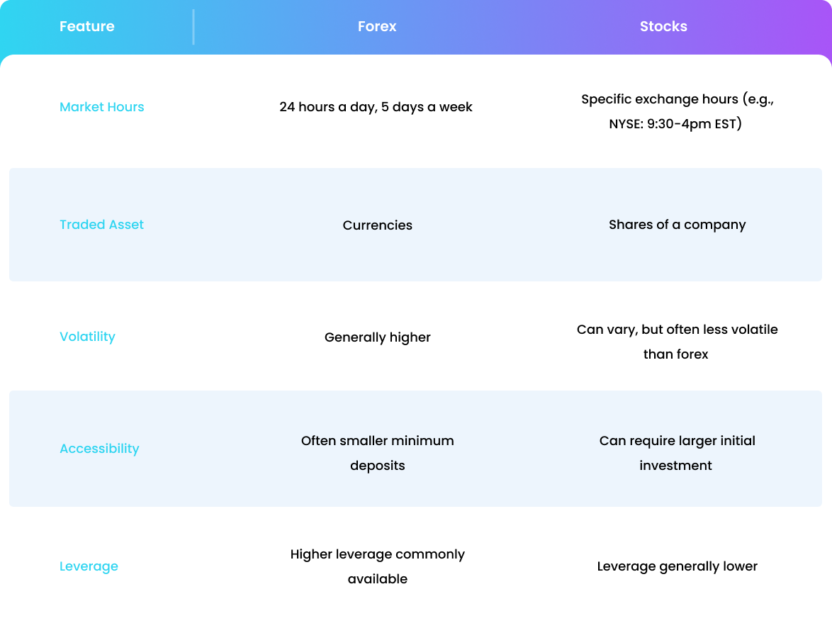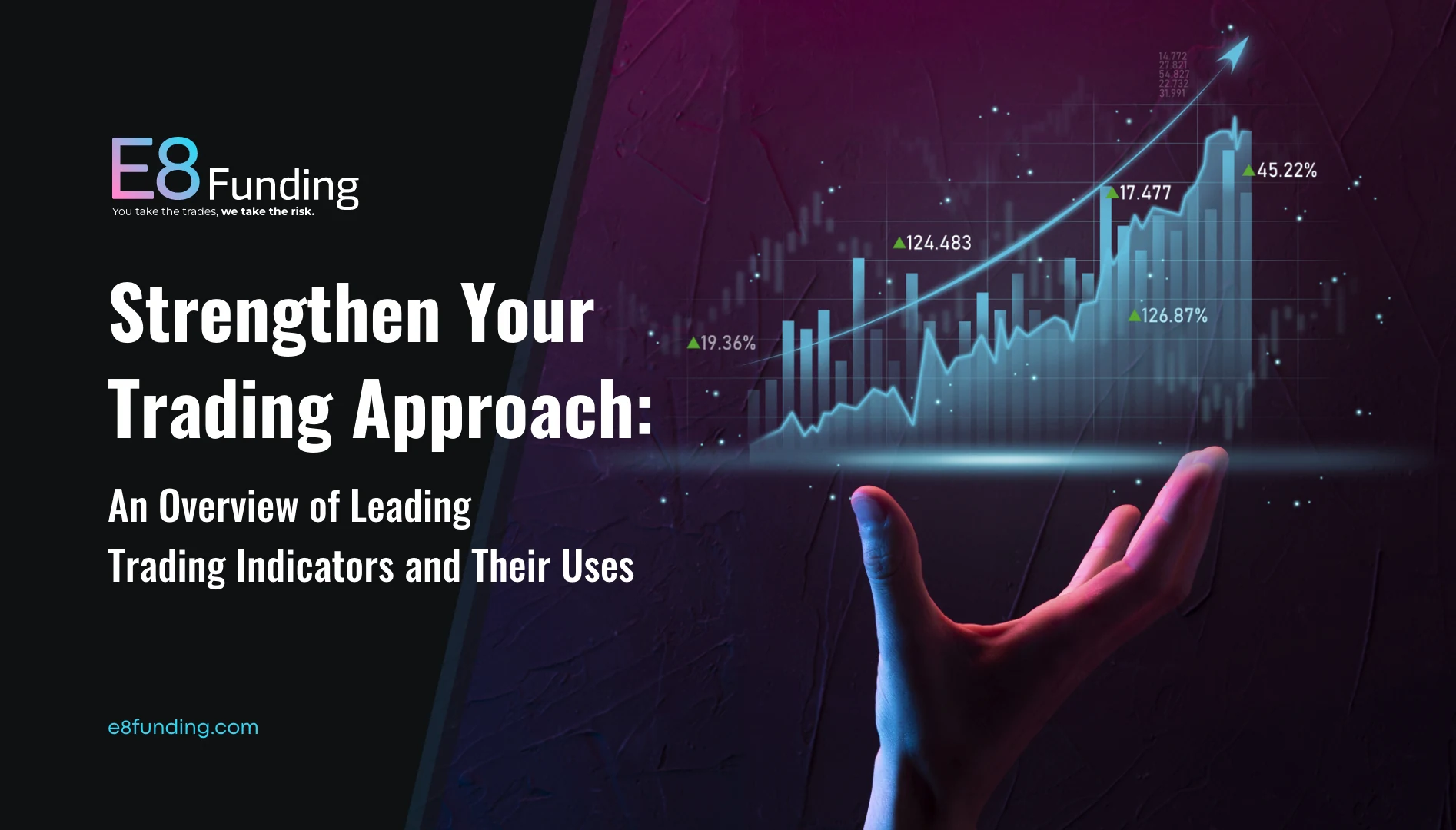Forex vs. Stocks: Which is Best for Beginners?
Stocks are a cornerstone of investing – but could trading them alongside currencies diversify your portfolio? If you’ve been successful in the Forex market but have been curious about the opportunities the stock market presents, you’re not alone. Many traders begin exploring stocks as a way to potentially increase their trading opportunities. This article breaks down the similarities and differences between Forex and stock trading, helping you decide if adding stocks to your arsenal is the right move.
Understanding Forex trading provides a solid foundation to compare and contrast with the world of stocks. If you’d like a quick refresher on the fundamentals, we have a guide on our blog, “How To Start Forex Trading“.
What is Forex?
You’re already familiar with the dynamic world of Forex trading, so let’s quickly recap a few key points. It centers around buying and selling currencies of different countries, always traded in pairs like the euro versus the US dollar (EUR/USD) or the British pound versus the Japanese yen (GBP/JPY).
The market stands apart as the largest financial market globally, with a daily trading volume of over $6.6 trillion. It also operates 24 hours a day, 5 days a week, offering flexibility that traditional stock exchanges simply can’t compete with. This constant activity means opportunities can arise at any time, making Forex a market that attracts those seeking fast-paced action. Economic news, interest rates, and even geopolitical events can significantly influence prices, making it essential for Forex traders to stay up-to-date on global happenings.
What are Stocks?
Forex trading offers exciting opportunities, but what if you’re interested in a different asset class altogether? Stocks, unlike currencies in Forex, represent fractional ownership in a company. When you buy a share of a company’s stock, you’re essentially becoming a part-owner with a vested interest in its success. The better the company performs, the higher the stock price is likely to climb, potentially leading to significant gains for you as an investor.
Stocks are traded on regulated marketplaces called stock exchanges. Well-known exchanges include the New York Stock Exchange (NYSE) and the Nasdaq. Companies go public by issuing shares through a process called an Initial Public Offering (IPO), allowing them to raise capital for expansion and growth. Once public, these companies are subject to regulations and reporting requirements to ensure transparency for investors like you.
Stock prices constantly fluctuate based on a complex interplay of factors. A company’s performance, industry trends, overall economic conditions, and even the general mood of investors can all influence its stock price. When a company performs well, its stock price is likely to rise, potentially leading to significant gains for investors who bought shares at a lower price. Conversely, a company’s struggles can cause its stock price to fall.
There are several ways to invest in stocks. You can buy and sell them directly through an online brokerage or work with a financial advisor who can help you build a portfolio that aligns with your risk tolerance and investment goals. However, at E8 Markets, we specialize in a different approach to the stock market – stock indices.
What are Stock Indices?
While individual stocks offer the potential for high rewards, they also carry inherent risks. Stock indices provide another way to participate in the stock market and potentially benefit from its growth. An index is a collection of stocks selected based on specific criteria, such as industry sector, company size, or geographic location. These indices effectively track the performance of a particular market segment.
Examples of Stock Indices E8 Markets Offers:
E8 Markets allows you to trade popular stock indices that track the performance of major companies and sectors. Here are a few examples:
- Dow Jones Industrial Average (DJIA or “the Dow”): Tracks 30 large, blue-chip US companies.
- S&P 500: Tracks 500 major US companies and is considered a strong indicator of the broader US stock market’s performance.
- DAX 40: Tracks the 40 largest companies on the Frankfurt Stock Exchange.
- Nasdaq Composite: Heavily weighted towards technology companies.
- FTSE 100 (“Footsie”): Tracks the top 100 companies on the London Stock Exchange.
By trading indices, you gain exposure to a basket of stocks within a particular market segment, offering diversification and potentially reducing some of the risk associated with individual stocks.
Key Differences: Forex vs Stocks
Understanding the fundamental differences between the Forex and stock markets is crucial when deciding which may better align with your trading style and risk tolerance. While both offer potential opportunities, the underlying assets, market dynamics, and trading strategies differ significantly. Let’s break down the key areas of distinction:
- Market Hours: The FX market operates 24 hours a day, 5 days a week, offering flexibility and the potential for around-the-clock trading. Stock markets, on the other hand, have specific trading hours tied to the exchanges where they’re listed. This limits the time frame within which you can buy and sell stocks.
- Asset Type: Forex trading revolves around exchanging one currency for another. It’s essentially a bet on the relative strength of different countries’ economies. In contrast, stocks represent fractional ownership in a company. Your success as a stock investor is often tied to the company’s performance.
- Volatility: The FX market is well-known for its volatility, with currency prices potentially fluctuating rapidly in response to economic news, interest rate shifts, and geopolitical events. While stocks can also experience volatility, price movements are often less dramatic in the short term, except during major company-specific news events.
- Accessibility: Forex trading often has lower barriers to entry. Smaller minimum account sizes and the ease of opening an account make it accessible to a wider range of traders. Stock trading can require larger initial investments, depending on the specific stocks or indices you wish to trade.
- Leverage: Forex brokers generally offer high leverage, allowing you to control a larger position with a smaller amount of capital. Leverage magnifies both potential profits and losses. While leverage is also available for stock trading, it’s usually offered at lower levels, reducing the degree of risk.

These key differences have a profound impact on your trading decisions. For instance, the 24-hour nature of the FX market makes it particularly appealing to those who might not be able to trade during traditional stock market hours. The volatility of Forex can be attractive to traders seeking fast-paced action but also calls for careful risk management strategies.
Which is Best for Beginners?
There’s no single answer to whether Forex or stocks are “better” for beginners. The most suitable choice depends on your individual trading personality, learning style, and risk tolerance. Let’s dive into aspects that might influence your decision:
Short-term vs. Long-term: Are you looking to make quick profits from market movements, or are you more interested in building a portfolio that grows over time? Forex, with its inherent volatility, caters more to short-term trading strategies like scalping and day trading. Stocks can be suitable for both short-term and long-term investors, with strategies ranging from day trading to long-term “buy and hold” approaches.
Active vs. Passive: How much time are you willing to dedicate to actively monitoring and analyzing the markets? The 24/7 nature of Forex can demand more attention from those seeking short-term opportunities. If you prefer a less hands-on approach, stock investing could be a good fit, particularly if you focus on dividend-paying stocks or index funds.
Excitement vs. Stability: Are you drawn to the fast-paced, potentially adrenaline-fueled world of Forex, or do you prefer the slightly slower and potentially more predictable nature of certain areas of the stock market? Your personality plays a role in choosing the market environment in which you’ll thrive.
It’s Not Just One or the Other
Many traders find that diversifying their portfolios with both Forex and stocks provides balance and opens up a wider range of opportunities. It’s perfectly fine to start with the market that best suits your immediate goals and then expand your horizons as you gain experience and confidence.
E8 Markets offers opportunities to explore trading Forex and stock indices through trial accounts. Experimentation is key! Take the time to determine which asset class excites you and aligns with your short-term and long-term trading objectives.
Conclusion
Whether you’re drawn to the dynamic, ever-changing world of Forex or intrigued by the potential of owning shares in leading companies, the world of trading opens a realm of possibilities. FX markets offer the excitement of rapid price movements and 24-hour accessibility, while the stock market provides opportunities for long-term growth and the potential benefits of company ownership.
Understanding the fundamental differences between these markets is crucial to making informed decisions. Factors such as volatility, accessibility, time commitment, and your individual learning style all play a role in determining which market might initially feel like a better fit.
The key takeaway is this: there’s no single “right” answer. Successful traders often diversify their portfolios with a mix of assets, including both Forex and stocks. At E8 Markets, we’re committed to empowering you on your trading journey. Our resources, tools, and focus on Forex and stock index trading can help you explore these exciting markets, and design a strategy that aligns with your unique goals.
Ready to Dive In?
Want to experience the thrill of Forex and stock index trading firsthand? The best way to discover which market suits you best is to try it! Register to E8X Dashboard and open up a trial account to begin your risk-free exploration today.
Article topics
Trade with E8 Markets
Start our evaluation and get opportunity to start earning.Disclaimer
The information provided on this website is for informational purposes only and should not be construed as investment advice. Always conduct your own research and consult with a qualified financial advisor before making any investment decisions. We do not endorse or promote any specific investments, and any decisions you make are at your own risk. This website and its content are not responsible for any financial losses or gains you may experience.
Please consult with a legal professional to ensure this disclaimer complies with any applicable laws and regulations in your jurisdiction.








